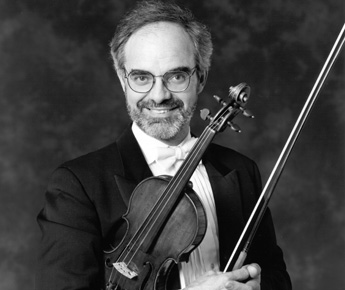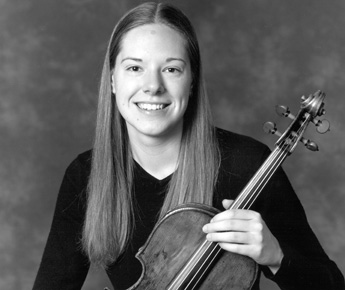Concert Review: Beethoven’s Missa solemnis at Symphony Hall
John Oliver, director of the Tanglewood Festival Chorus, deserves the thanks of all involved for his willingness to take on this unenviable assignment, as well as credit for ensuring that the performance didn’t fall off the tracks.
By Jonathan Blumhofer

The high point of the evening was, without a doubt, concertmaster Malcolm Lowe’s soaring account of the extended violin solo in the Benedictus that concludes the Sanctus.
Of the several cancellations that have befallen the Boston Symphony Orchestra (BSO) this season, perhaps none has been as calamitous as Kurt Masur’s late-notice withdrawal from this weekend’s performances of Beethoven’s monumental Missa solemnis. When news of this turn of events broke on Thursday, the orchestra announced that John Oliver, director of the Tanglewood Festival Chorus (TFC), would assume Mr. Masur’s place on the podium, a choice both expeditious and logical, since Mr. Oliver has been rehearsing the Missa with the chorus in preparation for these performances for some time now.
Surely, Mr. Oliver deserves the thanks of all involved for his willingness to take on this unenviable assignment, as well as credit for ensuring that the performance didn’t fall off the tracks. And the TFC and BSO, not to mention an All-Star lineup of soloists featuring Christine Brewer, Michelle DeYoung, Simon O’Neill, and Eric Owens, soldiered on with unflinching professionalism. Still, there were many moments in Friday’s performance that felt like three ensembles (the soloists, chorus, and orchestra) in search of a piece, each with their own distinctive idea about what it should be, rather than a single musical entity collectively exploring Beethoven’s most deeply felt statement on religious faith. If, in its best performances, this sprawling, Delphic score adds up to more than the sum of its parts, Friday’s reading—despite the best intentions of the performers and the wishes of the audience—was not one of those occasions, marred by too many basic ensemble problems, let alone interpretive shortcomings.
Though he spent his life in the predominantly Roman Catholic cities of Bonn and Vienna, Beethoven was anything but a traditional, observant Catholic. Heavily influenced by Kant, Schiller, and the Enlightenment, in the course of his life Beethoven read (among other things) Brahmin and Masonic texts and explored several Eastern religions, in addition to various forms of Christianity. His spiritual outlook was distinctly deistic: “Humanity, God, and Nature,” he wrote at one point, and these three themes permeate his late style (roughly from 1819 until his death in 1827). In preparation for writing the Missa, he immersed himself in what biographer Maynard Solomon calls “the rhetorical vocabularies of religious music of earlier periods,” including Church modes and music by the composers Palestrina, Bach, and Handel. In addition, there are unexpected, secular references throughout the piece (for instance, a militant rhythm in the closing Dona nobis pace), as well as quotations from other composers (including a couple of snatches of Handel’s Messiah). It all adds up to a distinctly Beethovenian brew: whereas his earlier music is marked by stark contrasts of mood, texture, and dynamics, in the Missa these contrasts are given added spiritual emphasis.
While tremendously distinctive, these dramatic dissimilarities often throw interpreters for loops, and a tentative unevenness characterized Friday night’s overall performance. There were some electrifying moments, to be sure, particularly in the Gloria and parts of the Credo. Mr. Oliver took the closing fugue of the Gloria at an energetic clip that almost made up for some problematic intonation in the orchestra mid-movement, while the big, characteristic gestures that Beethoven wrote into the Credo were painted with broad, bold brushstrokes.
Most of the Missa’s small moments, though, passed by without such clarity of purpose. A case in point was the first section of the Sanctus. This entire movement represents Beethoven at his most visionary, and its beginning is particularly remarkable: contrary to nearly every Sanctus setting of the Classical era, in the Missa, this section of the liturgy opens with a hushed, slowly unfolding melody in the orchestra, joined by the four soloists. Eventually, an anticipatory string tremolando forms the bridge to a rocketing choral fugue, and the movement continues. On Friday, the notes in this opening section were present, but the sense of awe and mystery that the music should convey was wholly absent. And so it was for stretches of the other movements, as well: This is a big composition made up of numerous, small parts, and one needs to have a clear understanding of how they all fit together in order for a performance to succeed. I have no doubt that Mr. Oliver and the musicians at Symphony Hall on Friday understood this, but it didn’t come across in their performance.
The high point of the evening was, without a doubt, concertmaster Malcolm Lowe’s soaring account of the extended violin solo in the Benedictus that concludes the Sanctus. Here we had a glimpse of what might have been had Mr. Masur and company been able to proceed as scheduled: the solo violin line beautifully phrased and sensitively accompanied by chorus and orchestra.
Beethoven’s late vocal writing is notoriously demanding—especially for high voices—and Friday night’s vocalists (both solo and choral) engaged it bravely. The quartet of soloists fared perhaps best, partly because Beethoven wrote less for them to sing. Ms. Brewer and Ms. DeYoung brought some nice color to their solo turns, though there were some balance issues between them. Making his BSO debut, Mr. O’Neill provided a clarion tenor, while the extraordinary Mr. Owens nearly stole the show with his majestic solo at the beginning of the Agnus Dei.
Singing from memory, the TFC performed with great strength and some fine diction (especially in the Gloria). As the evening wore on, there was some fatigue-related shrillness in the ensemble’s upper range, though, to be fair, they handled their challenging part as well as anybody I’ve heard live or on record, and they consistently gained strength heading into the score’s climactic sections. Still, there were several glaring intonation discrepancies between chorus and orchestra (and soloists, for that matter) that were very troubling, especially considering the high caliber of musicians engaged on stage.
Friday’s performance was the third of six UnderScore concerts this season. Assistant principal viola Cathy Basrak gave a brief introduction that (happily) avoided becoming painfully remedial, as these type of lectures often do. After the concert, organist James David Christie presented a short recital of pieces by Bach, Erland von Koch, and Jehan Alain that ably demonstrated the nuances of Symphony Hall’s “King of Instruments.”
In little more than a week, the BSO heads to Carnegie Hall for a residency that will include the Missa solemnis on its opening program. Let’s hope whoever fills in for Mr. Masur then (no replacement has yet been named) will have a vision for the piece and enough rehearsal time with the extended ensemble to make something of it. Despite the noble efforts of those involved, Friday’s performance was, unfortunately, more an aural reminder of the chaos and leadership vacuum that has engulfed the BSO in recent seasons than a cogent statement of Beethoven’s deepest spiritual sentiment.
Tagged: Boston Symphony Orchestra, Cathy Basrak, John Oliver, Missa solemnis

